Now, that you’ve brought your dog home after being neutered, you might be puzzled and concerned about why they are suddenly having accidents.
In this blog post, we’ll delve into the causes, signs, solutions, and prevention strategies related to this issue.
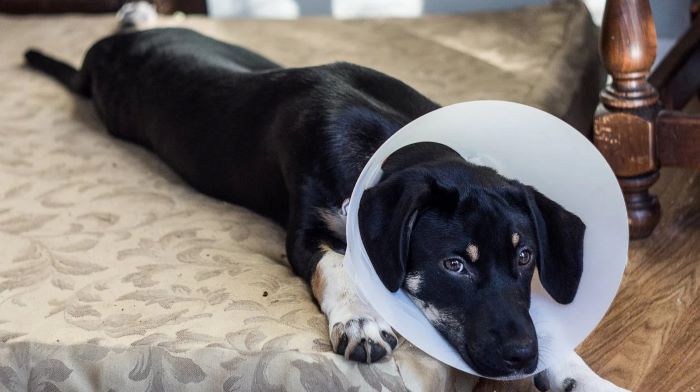
Let’s explore the possible reasons behind “Why is my dog having accidents after being neutered?” Shed light on the signs you should watch out for, discuss effective solutions to tackle the problem, and provide preventive measures to ensure a smooth recovery.
By understanding the underlying factors and implementing appropriate measures, you can help your furry friend get back on track with their potty habits.
Contents
Why Does My Dog Having Accidents After Being Neutered?
Neutering is a surgical procedure that removes the reproductive organs of a dog, either partially or completely. The term neutering can apply to both males and females, but it is also called castration for males and spaying for females.[1]
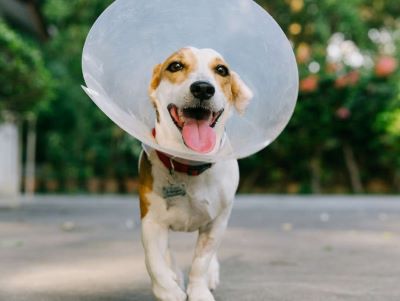
Neutering is carried out to stop unintended pregnancies, lessen aggressiveness, and increase the animal’s lifetime and general health.
Physical Changes That Occur During Neutering in Dogs
Neutering affects the production of sex hormones in the dog’s body, which can have various physical effects.
For example, neutered male dogs may have a lower metabolism and a higher appetite, which can lead to weight gain if their diet and exercise are not adjusted.
Infected uteruses, ovarian cancer, and breast tumors may all be less common in female dogs who have had sterilization.
Behavioral Changes That Occur After Neutering in Dogs
Neutering can also change the animal’s behavior, especially related to mating and territoriality. For instance, neutered male dogs may be less likely to roam, fight, or mark their territory with urine.
Neutered female dogs may be less likely to go into heat, which can cause stress and vocalization.
However, depending on the dog’s personality, age, and surroundings, these behavioral adjustments may differ.
Medical Conditions That Can Cause Accidents After Neutering in Dogs
The medical issues that might impair an animal’s urinary system and cause accidents can occasionally be brought on by or exacerbated by neutering.
Urinary incontinence, or lack of bladder control, is one of the most prevalent diseases.
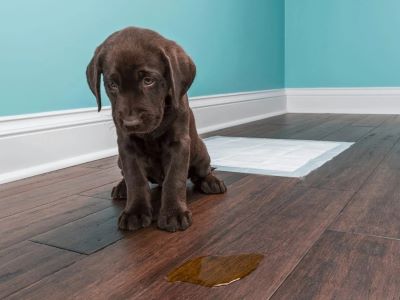
Some of the signs that your dog may have urinary incontinence are:[2]
- Dripping or leaking urine, especially when lying down or sleeping
- Wet or irritated skin or fur around the genital area
- Frequent licking of the genital area
- Urinating in unusual places or more often than usual
- Difficulty or pain when urinating
If you notice any of these signs, you should take your dog to the vet for a proper diagnosis and treatment. Urinary incontinence can be a sign of an underlying medical condition that needs attention.
A hormonal imbalance, nerve injury, or weakening of the sphincter muscle that regulates urine flow are all potential causes of this.
A veterinarian can make the diagnosis of urinary incontinence and provide medication, surgery, or other treatments.
Urinary tract infections, bladder stones, renal illness are some other conditions that might result in accidents following neutering.
Pain, irritation, or an increase in the frequency and urgency of urine can all be a result of these disorders. Also, a veterinarian with the right diagnostic tools and medicines can identify and handle them.
Signs of Dog Having Accidents After Being Neutered
Accidents after being neutered can be a sign of various issues, such as urinary incontinence, marking behavior, postoperative complications, anxiety or stress, or lack of training or reinforcement.
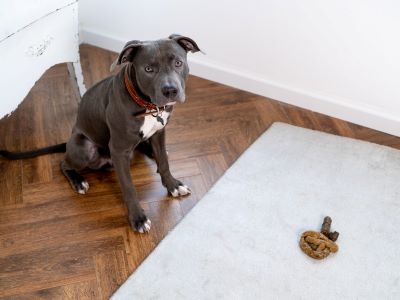
Here are some signs to look for if your dog is having accidents after being neutered:
- Urine leakage or dribbling, especially when your dog is sleeping, resting, or excited
- Wet spots on the bedding, furniture, or floor
- Frequent licking of the genital area
- Urinating in small amounts or straining to urinate
- Blood in the urine or discolored urine
- Urinating in unusual places or on objects, such as furniture, shoes, or walls
- Urinating more often than usual or at odd times
- Refusing food or water
- Discharge or swelling at the surgical site
- Opening of the stitches or surgical site
- Sluggishness or lethargy
- Hiding, whining, aggression, or depression
After having your dog neutered, if you observe any of these symptoms, you should call your veterinarian right once. Some of these symptoms can point to an urgent need for rapid care to a serious issue.
Your veterinarian can determine what caused the mishaps and can then recommend the proper course of action.
The Solutions for Post-neutering Accidents in Dogs
If your dog is having accidents after being neutered, don’t panic. There are some solutions that can help you and your dog cope with this temporary problem. Here are some of them:
Adjust Your Dog’s Diet and Hydration
Urinary incontinence, a condition where a dog loses control of its bladder and may leak pee involuntarily, is one of the potential reasons of accidents following neutering.
This may occur because, particularly in older or heftier dogs, neutering might weaken the muscles that regulate the bladder.
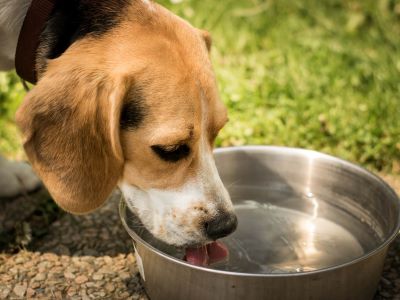
You may modify your dog’s nutrition and hydration to assist them with this problem. Here are a few advices:
- Feed your dog a low-fat, high-quality diet to prevent obesity and incontinence.
- Avoid salting your dog’s food to reduce thirst and water intake.
- Give your dog water regularly, but limit it at night or when you’re away.
- Add cranberry juice or supplements to your dog’s water or food to prevent UTIs and bladder stones.
Establish a Regular Bathroom Routine and Reward Good Behavior
Marking behavior, in which a dog urinates in certain locations around the house or yard to leave their smell, is another factor that might lead to accidents following neutering.
This is possible because neutering can occasionally generate a new marking habit in dogs, particularly if they experience insecurity or threat from environmental changes.
To help your dog with this issue, you can establish a regular bathroom routine and reward good behavior. Here are some tips:
- Increase potty breaks for your dog and pick a spot for them to go.
- Choose a potty spot away from where your dog likes to mark.
- Reward good potty behavior and ignore bad marking behavior.
- Clean up any accidents with an enzyme cleaner to remove odor and prevent more marking.
Monitor Your Dog’s Health and Recovery
A third possible cause of accidents after neutering is postoperative complications, such as bladder or urethral trauma. These complications can lead to pain and difficulty urinating, which may result in accidents.[3]
Additionally, anxiety or stress from the surgery or changes in the home environment can also cause accidents.
To help your dog with this issue, you can monitor their health and recovery. Here are some tips:
- Follow your vet’s post-operative care instructions for your dog.
- Check your dog’s wound for signs of infection or complication and contact your vet if needed.
- Provide your dog with comfort and care during the recovery period.
- Restrict your dog’s activity and exercise until they are fully healed.
- Observe your dog’s behavior and mood for signs of anxiety or stress and seek your vet’s help if necessary.
By following these solutions, you can help your dog overcome accidents after being neutered and enjoy a happy and healthy life with them.
The Prevention of Post-neutering Accidents in Dogs
While accidents after neutering are usually temporary and manageable, it is always better to prevent them from happening in the first place.
There are some steps you can take to reduce the risk of accidents in your dog before and after neutering. Here are some of them:
Choose the Right Time and Age for Neutering Your Dog
The moment and age at which you neuter your dog might have an impact on the risk of accidents afterward. The health and temperament of your dog, as well as the functioning of their urinary system, might suffer from neutering either too early or too late.
According to the American Kennel Club, The breed, size, sex, and particular circumstances of each dog will determine the ideal age for neutering.
In general, bigger breeds should be neutered later than smaller breeds since they grow more slowly. Early neutering can affect a dog’s growth and development, which can cause joint problems and cancer.
Late neutering increases the chance of unintended pregnancy, behavioral difficulties, and prostate disorders.
The majority of dogs may be neutered between the ages of 6 and 9 months, but it’s crucial to speak with your veterinarian about the ideal time for your dog.
Your veterinarian can evaluate the health, temperament, and way of life of your dog and help you decide when it is best to neuter them.
Prepare Your Dog for the Surgery and the Recovery Period
How well you prepare your dog for the procedure and the subsequent recuperation time might also influence the likelihood of accidents occurring after neutering.
Incisions, stitches, and anesthesia are all needed for major operation like neutering. Your dog can feel uncomfortable and anxious, which could lead to mishaps.
To help your dog cope with the surgery and the recovery period, you can prepare them in advance. Here are some tips:
- Have your dog checked by your vet before surgery.
- Follow your vet’s fasting guidelines for your dog.
- Make your dog comfortable and peaceful before and after surgery.
- Don’t give your dog any drugs or supplements without your vet’s consent.
- Keep your dog calm and quiet on the surgery day.
Follow Your Vet’s Instructions and Advice
A third factor that can influence the prevention of accidents after neutering is how well you follow your vet’s instructions and advice.
Your vet will give you specific guidelines on how to care for your dog after surgery, such as giving them pain medication, antibiotics, or anti-inflammatory drugs if prescribed.
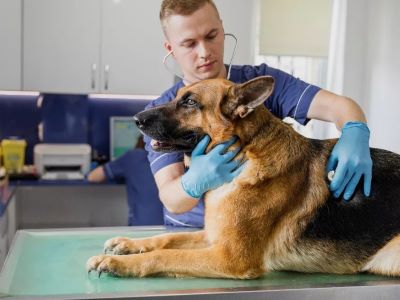
Your vet will also tell you what to expect during the recovery period, such as how long it will take for your dog to heal, what signs to look for in case of complications, and when to bring them back for a follow-up visit.
To help your dog recover smoothly and avoid accidents after neutering, you should follow your vet’s instructions and advice carefully. Here are some tips:
- Monitor your dog’s wound for signs of infection or complication and contact your vet if needed.
- Provide your dog with comfort and care during the recovery period.
- Restrict your dog’s activity and exercise until they are fully healed.
- Observe your dog’s behavior and mood for signs of anxiety or stress and seek your vet’s help if necessary.
- Follow these tips to prevent accidents and ensure your dog’s well-being after neutering.
FAQs
Is it normal for your dog to have accidents after being neutered?
It is normal for dogs to have accidents after being neutered due to anesthesia effects and temporary bladder control issues. However, persistent accidents or other concerning symptoms should be discussed with a veterinarian.
Why is my dog peeing on himself after being neutered?
Dogs may pee on themselves after being neutered due to anesthesia effects on bladder control, discomfort or pain, or excessive licking in the surgical area. Monitor the situation and consult a veterinarian if needed.
Why is my dog peeing everywhere after surgery?
Dogs may pee everywhere after surgery due to anesthesia effects on bladder control and the stress or changes in routine associated with surgery. Ensure regular bathroom breaks and consult a veterinarian if excessive urination continues or other concerning symptoms arise.
Is incontinence normal after neutering?
Incontinence is not considered normal after neutering. Temporary bladder control issues due to anesthesia may occur, but persistent incontinence should be evaluated by a veterinarian.
Conclusion
In conclusion of why is my dog having accidents after being neutered, It can be a temporary challenge for your dog and you as their caregiver.
However, with proper understanding of the causes, signs, and available solutions, you can navigate through this phase smoothly.
To sum up, be patient, provide consistent training, and consult with your veterinarian if needed. By following these steps, you can address the underlying issues, gradually restore your dog’s normal bathroom routine, and ensure a successful recovery.
Ultimately, the bond between you and your furry companion will grow stronger, and you’ll both enjoy many happy and accident-free days together.
References:
- Hart, B. L., Hart, L. A., Thigpen, A. P., & Willits, N. H. (2020). Assisting Decision-Making on Age of Neutering for 35 Breeds of Dogs: Associated Joint Disorders, Cancers, and Urinary Incontinence. Frontiers in Veterinary Science, 7. – Frontiers
- Urinary Incontinence in dogs. (2021, October 26). Veterinary Teaching Hospital. Retrieved July 6, 2023, from – Vaterinary Teaching Hospital
- Dacvecc, C. F. D. (2022). Dog Neuter Recovery: What to Expect. – PetMD

Julia is a Board Certified Veterinary Nutritionist, practicing veterinarian in a non-profit animal hospital and feline sanctuary located in Rochester, NY. She is also a full-time veterinary advisor at DogLikesBest. She focuses on writing healthcare-related topics including dog foods, treats, veterinary diets, food for specific healthcare features, etc. Moreover, any article on DogNeedsBest that has to concern feline health in any way, goes under her scrutiny before being published.


